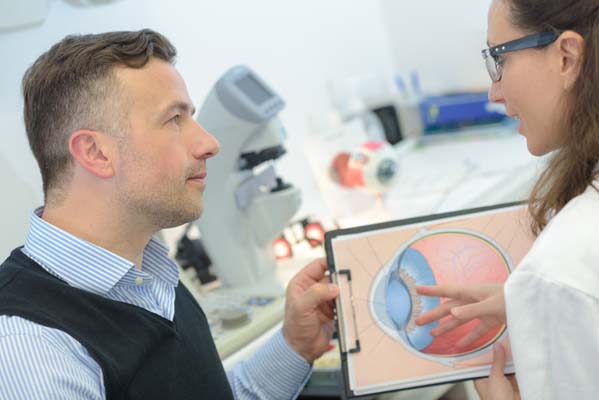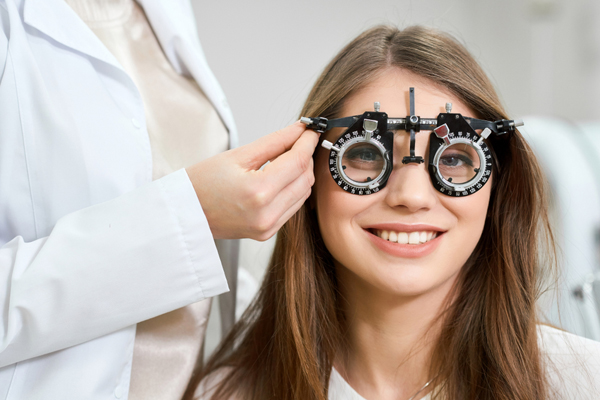What Is the Latest Treatment for Cataracts?

Cataract treatment options have improved a lot in the past few decades, and there are now more ways to go about treating the condition. The current treatment options for cataracts include surgical and non-surgical options aimed at improving vision deterioration.
Cataract treatment options
The early stages of cataract treatments are aimed at improving the quality of the patient’s vision. People tend to experience blurry or cloudy vision when they have cataracts. Other symptoms include double vision, poor vision in the dark, light sensitivity, changes to current eyewear prescription, and double vision.
Some of these symptoms can be improved with eyewear like magnifying lenses, sunglasses, and a new prescription for eyeglasses. Even simple things like repositioning lights can help to deal with some symptoms. A doctor might recommend wearing a hat outdoors along with a pair of shades to protect the patient’s eyes from sunlight and prevent their condition from getting worse.
Surgical treatments for cataracts might be recommended when changes to a person’s vision begin to interfere with their ability to perform everyday activities like watching TV or driving.
Surgical cataract treatments typically involve removing the clouded lens from the patient’s eyes and replacing it with artificial eyes. Optometrists often recommend cataract surgery when a patient’s vision is 20/40 or worse. Vision this poor impacts a person’s daily activities and occupational performance.
If both of a patient’s eyes are affected by surgery, each eye is operated on separately to minimize the risk of complications. The surgery is an outpatient procedure that involves using a local anesthetic. Patients might be advised to wear a night guard patch to protect the eye operated on during sleep.
The most cutting-edge treatments used to treat cataracts include:
- Phacoemulsification: This is the most commonly used procedure to remove cataracts. It involves using an ultrasonic device that vibrates into the eye via a small incision. The waves caused by the vibration break up the lens of the eye so it can be removed via suction. An artificial lens is then inserted into the eye. A single stitch might be used to close the eye
- Extracapsular cataract surgery: This is a lot like phacoemulsification, but it requires making a larger incision so the lens is taken out in one piece. The larger incision requires more stitches to close the eye after the operation, and it is more likely to lead to complications like induced astigmatism
- Intracapsular cataract surgery: This is a rare procedure that involves removing the lens and the capsule via a large incision. This treatment is only recommended for advanced cataracts
Frequently asked questions about cataracts treatment
Time to answer some of the inquiries you might have regarding cataracts treatment:
1. What are cataracts?
Cataracts are a disorder that affects the lens of your eye. The lens is responsible for focusing light onto the retina, and over time, cataracts can cause the lens to become cloudy or opaque. This can lead to decreased vision and, in severe cases, blindness.
2. What causes cataracts?
Several different factors can contribute to the development of cataracts, including aging, diabetes, smoking, and prolonged exposure to ultraviolet (UV) light. In most cases, cataracts develop slowly and painlessly over time.
3. How are cataracts treated?
Cataracts are typically treated with surgery. The cloudy lens is eliminated and replaced with a clear artificial lens during surgery. Surgery is usually very successful in restoring vision.
4. How can I prevent cataracts?
You can do various things to help reduce your risk of developing cataracts, including wearing sunglasses or other protective eyewear when outdoors, quitting smoking, and managing diabetes.
5. What are the symptoms of cataracts?
The most widespread symptom of cataracts is blurry vision. Other symptoms can include difficulty seeing at night, halos around lights, and poor vision in dim lighting. If you encounter any of these symptoms, it is crucial to see an eye doctor for an evaluation.
6. When should I see an eye doctor?
If you’re experiencing any symptoms of cataracts, it is essential to see an eye doctor for an evaluation. Your doctor can determine if cataracts are the cause of your symptoms and recommend treatment.
7. Can cataracts be cured?
Cataracts cannot be cured, but they can be treated with surgery. Surgery is usually very successful in restoring vision.
We can help to restore your vision
Cataracts can be managed with non-surgical treatments in the early stages, and surgical treatments can be used to remove your cloudy lens and replace it with an artificial lens. Surgical treatments are recommended when the vision impairment caused by cataracts starts to interfere with daily activities. Call or visit our Mt Vernon clinic to set up an appointment with our optometrist.
Request an appointment here: https://brighteyesmv.com or call Bright Eyes Optometry at (914) 668-1429 for an appointment in our Mt Vernon office.
Check out what others are saying about our services on Yelp: Read our Yelp reviews.
Recent Posts
Emergency eye care is needed if you find yourself dealing with a problem with your eye that causes pain or affects your vision. Failing to treat eye injuries as soon as they are detected can lead to permanent consequences, like reduced vision or blindness. Common eye injuries that require emergency eye care include: Exposure to…
Looking for more information on eye protection? An ophthalmologist knows everything there is to know about protecting the eyes. While there are a few different types of eye care professionals, ophthalmologists are eye care professionals who have undergone additional years of education and training so they can offer their patients both medical and surgical eye…
Controlling myopia at an early age can slow down its progression. This can help prevent yearly upgrades for stronger glasses. Your optometrist can help by offering various treatments. If you want to find out how your optometrist can help control myopia, here are the details.Optometrists use atropine eye drops to achieve short-term myopia control results.…
Another word for an itchy eye is ocular pruritis. It is a common health situation in many people. Itchiness in your eyes is more than enough reason to see an optometrist. Receiving prompt treatment is important in receiving prompt relief. If you want to know what causes an itchy eye and the treatments for it,…



